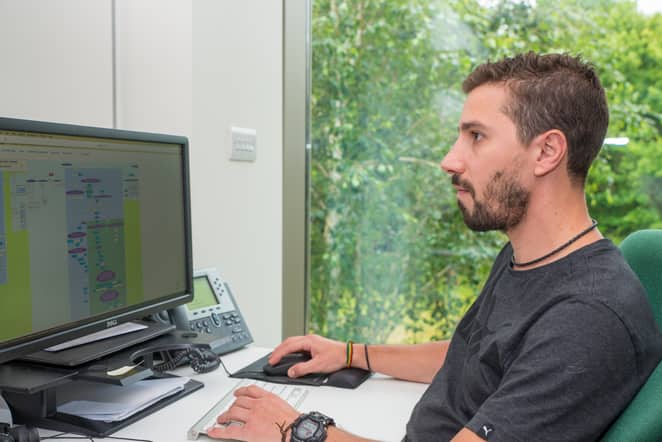The laboratory of structural biology of macromolecular protein-RNA complexes headed by Dr. Eva Kowalinski at the EMBL Grenoble is seeking a Research Assistant to support current projects in the laboratory. The thriving group uses a multidisciplinary approach to tackle complex biochemical questions by combining state-of-the art cryo-EM, X-ray crystallography, biochemical and biophysical methods, and cell biology. In the group, we believe in growing with our challenges, lifelong learning and team play.
Your role
We are seeking to attract a highly motivated and ambitious individual to join our investigations on the structure and function of protein-RNA complexes involved in RNA modification and editing. Ideally, you would be eager to deepen the knowledge in the field of integrated structure biology by contributing to the advancement of well established projects in the lab.
You will:
- Clone, express and purify proteins.
- Produce and purify RNA.
- Perform protein and RNA quality control and activity assays.
- Prepare samples for X-ray crystallography or cryo-EM.
- Comprehensively document work progress and present within the group.
Closing date: 9 January 2022
You have
You are an enthusiastic curiosity driven scientist with a Bachelor, Master or Technician degree with experience in:
- Molecular biology methods (PCR, different cloning methods, mutagenesis)
- Protein expression in E. coli and mammalian cell systems.
- Protein purification (affinity, ion exchange, size exclusion chromatography, AKTA purification system and associated software)
- Sterile cell culture techniques
- Protein analysis (SDS PAGE, UPLC/HPLC, Western blotting, activity assays)
You are a team player with excellent documentation, organisation and communication skills with the ability to work on several projects and conduct experiments in parallel.
You are capable of independent planning and realistic time management.
You are motivated to learn new techniques and methods.
You can write and speak English.
You might also have
- Knowledge of biophysical characterization of proteins
- Experience with RNA manipulation
- Experience with sample preparation, data collection and data processing in X-ray crystallography and/or cryo-EM
- Experience with molecular visualisation of proteins (PyMOL, ChimeraX, etc.)
- Knowledge of French is not required
What else you need to know
EMBL is an inclusive, equal opportunity employer offering attractive conditions and benefits appropriate to an international research organisation with a very collegial and family friendly working environment.
We are Europe’s flagship research laboratory for the life sciences – an intergovernmental organisation performing scientific research in disciplines including molecular biology, physics, chemistry and computer science. We are an international, innovative and interdisciplinary laboratory with more than 1600 employees from many nations, operating across six sites, in Heidelberg (HQ), Barcelona, Hinxton near Cambridge, Hamburg, Grenoble and Rome.
Our mission is to offer vital services in training scientists, students and visitors at all levels; to develop new instruments and methods in the life sciences and actively engage in technology transfer activities, and to integrate European life science research.
With the application, please submit your letter of motivation, your CV, and up to two references. The reference letters can as well be submitted directly to kowalinski@embl.fr.
Additional emailing your application is not necessary.
For any additional information please contact Eva Kowalinski directly (kowalinski(at)embl.fr) or visit our website: https://www.embl.org/groups/kowalinski/
Earliest start date: 01/02/22
Please apply online through: www.embl.org/jobs



